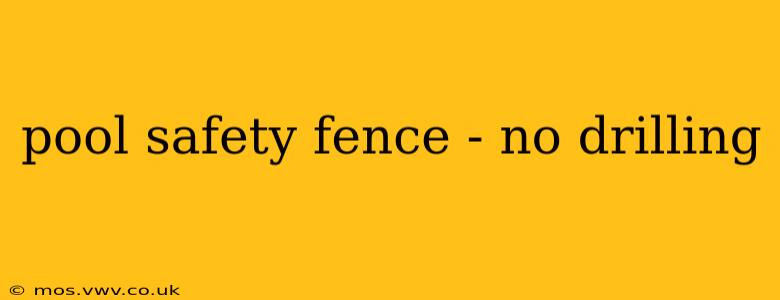Keeping your pool area safe, especially with children or pets around, is paramount. A pool fence is a crucial safety measure, but the thought of drilling holes in your deck or patio can be daunting. Fortunately, there are many excellent no-drill pool fence options available, offering a balance of security and aesthetic appeal without the hassle of permanent installation. This comprehensive guide will explore various no-drill pool fencing solutions, addressing common concerns and helping you choose the best fit for your needs.
What are the Different Types of No-Drill Pool Fences?
Several types of pool fences avoid drilling, each with its own advantages and disadvantages. Let's delve into the most popular options:
1. Above-Ground Pool Fence Panels:
These are self-supporting panels that stand independently, typically using weighted bases or clamps to secure them to the ground. They are easy to install and remove, making them ideal for renters or those who want flexibility. However, they might not be as visually appealing as other options and may require more frequent adjustments to ensure stability.
2. Mesh Pool Fence Systems:
Mesh fences are lightweight and offer good visibility, allowing you to keep an eye on the pool area. Many mesh systems utilize tensioning mechanisms and ground anchors, avoiding the need for drilling. They are relatively affordable and easy to install, although durability can vary depending on the material and construction.
3. Temporary Pool Fencing:
These are often lightweight, portable fences designed for temporary use. They're perfect for short-term needs or events, but might not offer the same level of robust security as more permanent solutions. They frequently utilize stakes or ground anchors, eliminating the need for drilling.
4. Self-Closing Gate Options:
Regardless of the fence type you choose, ensure that it incorporates a self-closing and self-latching gate. This crucial safety feature prevents accidental access to the pool area. Many no-drill fence options are compatible with self-closing gate systems.
How Secure are No-Drill Pool Fences?
The security of a no-drill pool fence depends heavily on the quality of the materials, the installation method, and the chosen system. While some may worry about their stability compared to drilled fences, many high-quality no-drill options meet or exceed safety standards. Always prioritize systems that are properly anchored and designed for pool safety compliance. Look for fences that meet or exceed local and national safety codes.
Are No-Drill Pool Fences Difficult to Install?
Generally, no-drill pool fences are easier to install than their drilled counterparts. Many come with clear, step-by-step instructions, and some companies offer professional installation services. The ease of installation varies slightly depending on the chosen type and the specific system.
How Much Do No-Drill Pool Fences Cost?
The cost of a no-drill pool fence can vary widely depending on the materials, size, style, and brand. Generally, they are competitively priced with traditional fences, and the absence of professional drilling services can sometimes save you money. It's always wise to obtain multiple quotes before making a purchase.
What are the Maintenance Requirements for No-Drill Pool Fences?
Maintenance requirements will depend on the materials used. Regular cleaning and occasional adjustments might be needed to maintain stability and ensure proper functionality. Always check the manufacturer's instructions for specific maintenance recommendations.
Can I Install a No-Drill Pool Fence Myself?
Many no-drill pool fence systems are designed for DIY installation. However, if you're unsure about any aspect of the installation, it's best to consult a professional to ensure proper installation and compliance with safety standards.
Choosing the right no-drill pool fence involves careful consideration of your needs, budget, and the specific characteristics of your property. Prioritizing safety and compliance with local regulations should be your top priority when selecting and installing your pool fence. Remember to always consult local building codes and regulations to ensure your chosen fence meets all safety standards.
